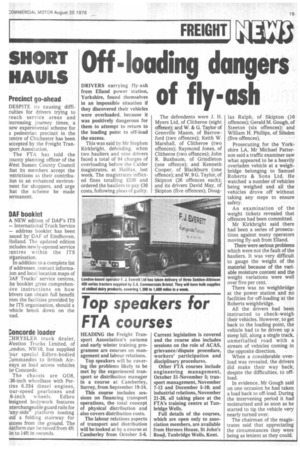of fly-ash
Page 21

If you've noticed an error in this article please click here to report it so we can fix it.
The defendents were J. H.
• Myers Ltd, of Clitheroe (eight offence); and W. & G. Taylor of Grenville Mason, of Barrowford (two offences); Keith W. Marshall, of Clitheroe (two offences); Raymond Jones, of Clitheroe (two offences); John R. Buxbaum, of Grindleton (one offence); and Kenneth Cooper, of Blackburn (one offence); and W. 9 G. Taylor, of Skipton (26 offences each); and its drivers David May, of Skipton (five offences); Doug las Ralph, of Skipton (10 offences); Gerald M. Gough, of Steeton (six offences); 'and William H. Phillips, of SiIsden (five offences).
Prosecuting for the Yorkshire LA, Mr Michael Patter son said a traffic examiner saw what appeared to be a heavily overladen vehicle at a weigh bridge belonging to Samuel Roberts & Sons Ltd. He watched a number of vehicles being weighed and all the vehicles drove off without taking any steps to ensure safety.
An examination of the weight tickets revealed that offences had been committed.
Mr Kirkbright said there had been a series of prosecutions against many operators moving fly-ash from Elland.
There were serious problems which were not the fault of the hauliers. It was very difficult to gauge the weight of the material because of the vari able moisture content and the weight variations were well over five per cent.
There was no weighbridge at the power station and no facilities for off-loading at the Roberts weighbridge.
All the drivers had been instructed to check-weigh their vehicles. However, to get back to the loading point, the vehicle had to be driven up a steep hill, along a single track, unmeitalled road with a stream of vehicles coming in the opposite direction.
When a considerable overload was revealed, the drivers did make their way back, despite the difficulties, to offload.
In evidence, Mr Gough said on one occasion he had taken a load back to off-load. During the intervening period it had moisturised and as soon as he started to tip the vehicle very nearly turned over.
The chairman of the magistrates said that appreciating the circumstances they were being as lenient as they could.




































































































